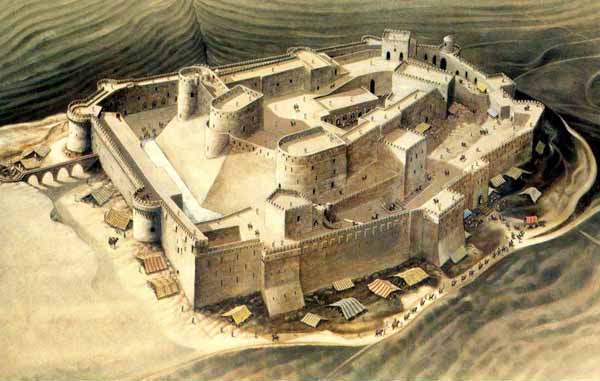
The Siege of Kerak took place in 1183, with Saladin's forces attacking and being repelled from the Crusader stronghold.
Kerak was the stronghold of Renaud de Chatillon, Lord of Oultrejordain, 124km south of Amman. The fortress was built in 1142 by Pagan the Butler, Lord of Montreal. While Renaud ruled, several truces existed between the Christian and Muslim states in the Holy Land, none of which he made any qualms about breaking. The last straw came in 1183 when he organized an expedition around the Red Sea. He captured the town of Eilat, giving him a base of operations against Islam's holiest city, Mecca. Saladin, the leader of the Muslim forces, could not tolerate this and moved against Renaud's stronghold.
The Muslims had sought to take Kerak for several years, but now they stretched its defenses to breaking point. At one point, 9 catapults were bombarding the walls and inhabitants within.
|
Inside the walls, a royal marriage was taking place. Humphrey IV of Toron, Renaud's stepson and heir was to take the hand of Isabella of Jerusalem, the King's stepsister (see The Counts of Anjou). As the wedding ceremonies continued, Saladin instructed his troops to avoid bombarding the young couple's quarters, but pressure on Kerak continued. Messengers managed to escape the town and take word to the King, Baldwin IV.
The king immediately marched with a relief force, accompanied by his regent, Raymond III of Tripoli. The Christian forces arrived while Saladin was still struggling against the heavy fortifications. Knowing he lacked the troops for a pitched battle, and risked being crushed between the Royal army and the walls of Kerak, he fled.
The King of Jerusalem had again outwitted his Muslim rival, all the time suffering from crippling Leprosy. While neither the King's life, nor the Crusaders' luck, would last much longer, it was a decisive show of strength.
Saladin returned to Kerak again in 1184, with the same result. Kerak remained a Crusader stronghold and a symbol of the West's grip in the region until falling to Muslim control in 1263. The next time the Crusaders had to contend with a major siege, it was at the walls of Jerusalem itself.
The motion picture Kingdom of Heaven contains a fictional portrayal of the siege, in which the Knights of Ibelin and the Ayyubids engage in battle. In the film, the Knights attacked so defenseless citizens could retreat to Renaud's castle.